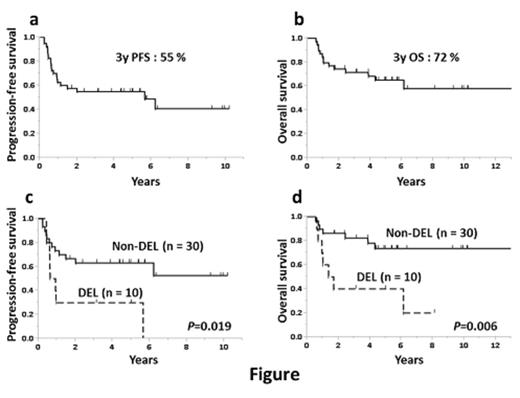Abstract
Background
Recent studies have shown that the concurrent expression of MYC and BCL2 protein evaluated by immunohistochemistry (IHC) in patients with de novo diffuse large B-cell lymphoma (DLBCL) is associated with worse survival when treated with standard R-CHOP, but the effect of intensive chemotherapies for such patients is unknown. Thus, we evaluated the impact of the co-expression of MYC and BCL2 protein among patients with advanced DLBCL, who were treated with a dose-intensive immunochemotherapy followed by up-front autologous stem cell transplantation (ASCT).
Patients and Methods
This is a retrospective analysis of patients with de novo DLBCL, who were categorized into high/high-intermediate risk by the age-adjusted International Prognostic Index (aaIPI). They were consecutively treated with the R-Double-CHOP regimen, consisting of rituximab (375 mg/m2, day -2), cyclophosphamide (750 mg/m2, day 1, 2), doxorubicin (50 mg/m2, day 1, 2), vincristine (1.4 mg/m2 [maximum 2.0 mg/body], day 1) and prednisolone (50 mg/m2, day 1-5) followed by consolidative high-dose chemotherapies at our institution from 2001 to 2013. MYC and BCL2 protein were measured by IHC assay using formalin-fixed paraffin-embedded tissue specimens for all available cases. Cut-off values of positivity for MYC and BCL2 protein were set as 40% and 50% of stained tumor cell, respectively. Lymphomas showing concurrent positivity for MYC and BCL2 protein were defined as "Double expressor lymphoma (DEL)".
Results
A total of 40 patients with a median 53-years (range 19-68) of age were analyzed. Twenty-one patients were at high risk and the other 19 patients were at high-intermediate risk by aaIPI. Cell of origin (COO) subtypes classified by Hans algorithm consisted of 14 germinal center B-cell (GCB) type and 26 non-GCB type. Totally, 10 (25%) patients were categorized into DEL. The overall response (OR) and the complete response (CR) rates to R-Double-CHOP for all patients were 93% and 83%, respectively. The OR and the CR rates were not significantly different between the DEL group and the non-DEL group (100% vs 90%, and 80% vs 83%, respectively). The proportion of patients proceeding to ASCT was not significantly different among these groups (50% vs 60%). With a median 52 months (range 3-155) of follow-up, the 3-year progression-free survival (PFS) and the overall survival (OS) rates for all patients were 55% and 72%, respectively (Figure a, b). Both the PFS and the OS were significantly worse in the DEL group than in the non-DEL group (Figure c, d). As for aaIPI and COO subtyping, either high/high-intermediate risk or GCB/non-GCB subtype were not significantly associated with the outcome of PFS or OS.
Conclusion
The concurrent expression of MYC/BCL2 protein in advanced DLBCL was associated with shorter remission duration and worse survival despite similar susceptibility to the treatment when a dose-intensive immunochemotherapy was applied. Our findings suggest that patients with advanced DEL may not benefit from dose-intensified therapies, and therefore need highly discrete strategies.
Miura:Astellas Pharma Inc.: Honoraria; Celgene K.K.: Honoraria; Sumitomo Dainippon Pharma Co., Ltd.: Honoraria; CHUGAI PHARMACEUTICAL CO. LTD: Honoraria; Kyowa Hakko Kirin CO., Ltd, Japan: Honoraria; Meiji Seika Pharma: Honoraria; Janssen Pharmaceutical K.K.: Honoraria. Hatta:Kyowa Hakko Kirin CO., Ltd, Japan: Honoraria; CHUGAI PHARMACEUTICAL CO. LTD: Honoraria; Celgene K.K.: Honoraria. Iriyama:Brystol-Myers K.K.: Honoraria. Takei:Kyowa Hakko Kirin CO., Ltd, Japan: Research Funding; Bristol-Myers K.K.: Research Funding; Nippon Kayaku Co.: Research Funding; Shionogi & Co.: Research Funding; Meiji Seika Pharma: Research Funding; Astellas Pharma Inc.: Research Funding; Janssen Pharmaceutical K.K.: Research Funding; TEIJIN PHARMA LIMITED: Research Funding; CSL Behring K.K: Research Funding; Japan Blood Products Organization: Research Funding; Sumitomo Dainippon Pharma Co.: Research Funding; TORII, PHAMACEUTICAL CO: Research Funding; Alexion Pharmaceuticals: Research Funding; YAKULT HONSHA CO., Ltd.: Research Funding; Taisho Toyama Pharmaceutical Co., Ltd.: Research Funding; TAIHO PHARMACEUTICAL CO., Ltd.: Research Funding; CHUGAI PHARMACEUTICAL CO. LTD: Research Funding.
Author notes
Asterisk with author names denotes non-ASH members.


This feature is available to Subscribers Only
Sign In or Create an Account Close Modal